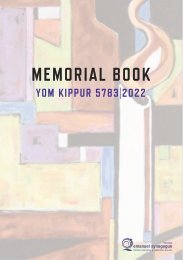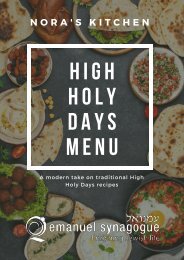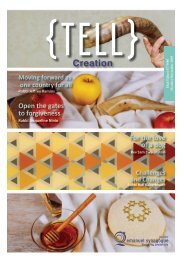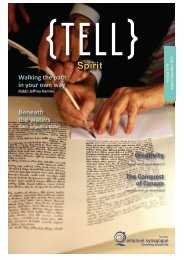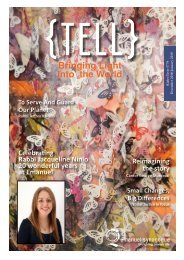Create successful ePaper yourself
Turn your PDF publications into a flip-book with our unique Google optimized e-Paper software.
{SPEAK UP IN THE FACE OF INJUSTICE}<br />
Donna Jacobs Sife<br />
Of the many and various ideas that arise from the festival of Pesach, I find one<br />
particularly compelling. The sages tell us that the syllables of the word Pesach each<br />
represent a word in their own right: "Pe" means "mouth" and "sach" means "speaks".<br />
When I was 12, I became a ‘selective<br />
mute’. I stopped talking for several<br />
months. And now, when asked how<br />
I became a storyteller, this image of<br />
a mute young girl comes to mind.<br />
Perhaps I became a storyteller so<br />
that my words would be heard. And<br />
I suspect also that my penchant<br />
for social justice and speaking up<br />
also has roots in that young girl.<br />
However, the imperative to speak<br />
up in the face of injustice also has<br />
its roots in Judaism. The midwives<br />
Puah and Shifra spoke up when<br />
they refused to follow the orders<br />
of the Pharaoh and chose to save<br />
a little baby boy. The Pharaoh’s<br />
daughter spoke up when she saw<br />
that little baby floating down the<br />
river in a basket. Moses stood<br />
before the Pharaoh and spoke up in<br />
the name of his enslaved brethren.<br />
We are a People today, because<br />
others chose to speak and not<br />
remain silent in the face of injustice.<br />
It is in our origins, in our genesis.<br />
Dissent gave birth to us as a nation.<br />
Think of Abraham, when faced<br />
with the injustice as he saw it<br />
of the destruction of Sodom<br />
and Gomorrah by God. Even<br />
to the highest authority,<br />
Abraham was not deterred.<br />
“Will You sweep away the innocent<br />
along with the guilty? What if there<br />
should be fifty innocent within the<br />
city; will You then wipe out the<br />
place and not forgive it for the sake<br />
of the innocent fifty who are in it?”<br />
Abraham points out that there<br />
are innocent people living in<br />
Sodom and Gomorrah who do<br />
not deserve punishment. He<br />
begins bartering with God, asking<br />
how many innocent people there<br />
would have to be for the cities to<br />
be spared. He ultimately bargains<br />
18<br />
down to 10 innocent people<br />
before the episode concludes.<br />
As Abraham says,<br />
“Far be it from You to do such a<br />
thing, to bring death upon the<br />
innocent as well as the guilty,<br />
so that innocent and guilty fare<br />
alike. Far be it from You! Shall<br />
not the Judge of all the earth<br />
deal justly?” (Genesis 18:25).<br />
Elie Wiesel<br />
We know that Sodom and<br />
Gomorrah were not spared. But we<br />
also know by Abraham’s example, in<br />
the words of the Pirkei Avot: You do<br />
not have to complete the task, but<br />
neither are you free to desist from it.<br />
Of course, there are many in this<br />
troubled world who are silenced,<br />
because to speak up is a dangerous<br />
thing. To be silenced is to be<br />
controlled, oppressed, subdued. We<br />
know that in countries governed<br />
by despotic dictators, any hint of<br />
rebellion could be punishable by<br />
death. In 2015, the Australian<br />
parliament passed a law concerning<br />
workers and medical officers at<br />
the detention centres. It became a<br />
criminal offense for them to reveal<br />
to outsiders what is happening to<br />
asylum seekers, with a potential<br />
penalty of job loss and two years<br />
in prison. When refugees speak<br />
of their experience in public,<br />
they do so understanding that<br />
it could very likely adversely<br />
affect their immigration status.<br />
In Australia, for the most part,<br />
we are free. We can express our<br />
concerns, our criticisms, our<br />
protests, without fear of retribution.<br />
And yet, because this freedom is a<br />
given, we tend to take it for granted,<br />
and forget how lucky and privileged<br />
we are to live in such a country.<br />
And consequently, we do not use<br />
that privilege in the way that our<br />
ancestors have modelled to us. We<br />
forget that freedom and speaking<br />
up, pe-sach – are indelibly linked.<br />
Elie Wiesel in his acceptance<br />
speech for his Nobel Peace<br />
prize in 1986 put it this way:<br />
I swore never to be silent whenever<br />
and wherever human beings endure<br />
suffering and humiliation. We must<br />
always take sides. Neutrality helps<br />
the oppressor, never the victim.<br />
Silence encourages the tormentor,<br />
never the tormented. Sometimes<br />
we must interfere. When human<br />
lives are endangered, when human<br />
dignity is in jeopardy, national<br />
borders and sensitivities become<br />
irrelevant. Wherever men or women<br />
are persecuted because of their<br />
race, religion, or political views,<br />
that place must – at that moment –<br />
become the center of the universe.<br />
This Pesach, I hope to continue to<br />
speak up in the face of injustice,<br />
and to remember that I am one<br />
of the privileged few in this<br />
world who is free to do so.<br />
Tzdek Tzedek tirtof – Justice,<br />
Justice You shall Pursue.



